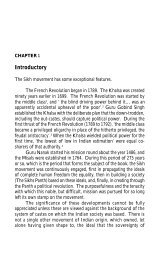The Sikh Turban: Post-911 Challenges to This Article of Faith
The Sikh Turban: Post-911 Challenges to This Article of Faith
The Sikh Turban: Post-911 Challenges to This Article of Faith
Create successful ePaper yourself
Turn your PDF publications into a flip-book with our unique Google optimized e-Paper software.
<strong>to</strong> extra-legal remedies, such as the assistance <strong>of</strong> <strong>Sikh</strong> action groups in encouraging<br />
employers <strong>to</strong> change their policies before an incident occurs or <strong>to</strong> settle in case one does<br />
arise. In other words, Title VII may be most effective for <strong>Sikh</strong>s where they are able <strong>to</strong><br />
convince employers, without formal judicial proceedings, <strong>to</strong> accommodate the <strong>Sikh</strong><br />
turban in the workplace. 190 <strong>The</strong> legal avenues available <strong>to</strong> <strong>Sikh</strong>s, though, may improve if<br />
a Workplace Religious Freedom Act, which would generally require employers <strong>to</strong> afford<br />
greater protections <strong>to</strong> religious employees, was finally passed by Congress. 191 Until then,<br />
negotiations and settlements may be a more productive route than private litigation for<br />
turbaned <strong>Sikh</strong>s.<br />
F. Pr<strong>of</strong>iling<br />
In 2004, Amnesty International reported that racial pr<strong>of</strong>iling <strong>of</strong> those appearing <strong>to</strong><br />
be Muslim was still prevalent. 192 An obvious setting for discrimination against <strong>Sikh</strong>s<br />
with turbans after the hijacking <strong>of</strong> four airliners on 9/11 is airports. Accordingly, one <strong>of</strong><br />
the most widespread problems for turbaned <strong>Sikh</strong>s after 9/11 has been airline racial<br />
pr<strong>of</strong>iling. 193<br />
190 See Remarks <strong>of</strong> Amardeep Singh, Legal Direc<strong>to</strong>r, <strong>The</strong> <strong>Sikh</strong> Coalition, Meeting <strong>of</strong> the<br />
U.S. Equal Employment Opportunity Commission, Employment Discrimination in the<br />
Aftermath <strong>of</strong> September 11, Dec. 11, 2001 (encouraging the E.E.O.C. <strong>to</strong> take steps <strong>to</strong><br />
“inform[] employers on how they can conform their corporate behavior <strong>to</strong> the<br />
requirements <strong>of</strong> the law when a situation that may possibly involve unlawful bias occurs.<br />
[Such measures] can serve as a way <strong>to</strong> proactively prevent discrimination before it<br />
occurs.”).<br />
191 See Debbie N. Kaminer, Title VII’s Failure <strong>to</strong> Provide Meaningful and Consistent<br />
Protection <strong>of</strong> Religious Employees: Proposals for an Amendment, 21 BERKELEY J. EMP.<br />
& LAB. L. 575, 628-629 (2000) (arguing that the Act would broaden Title VII protections<br />
for religious employees).<br />
192 Amnesty International USA, Racial Pr<strong>of</strong>iling: Threat and Humiliation: Racial<br />
Pr<strong>of</strong>iling, National Security, and Human Rights in the United States, available at<br />
http://www.amnestyusa.org/racial_pr<strong>of</strong>iling/report.<br />
193 See Ellmann, supra note 18, at 360 n.43 (“Because <strong>Sikh</strong> men wear turbans as a matter<br />
<strong>of</strong> religious duty, and because they are Asians, they became the victims <strong>of</strong> many<br />
unpleasant and intrusive incidents in airports after September 11.”). See generally Albert<br />
W. Alschuler, Racial Pr<strong>of</strong>iling and the Constitution, U. CHI. LEGAL F. 163, 163 (2002)<br />
(noting “a shift in sentiment” related <strong>to</strong> racial pr<strong>of</strong>iling after 9/11, with “81 percent <strong>of</strong> . . .<br />
respondents <strong>to</strong> a 1999 Gallup poll declar[ing] their opposition” <strong>to</strong> racial pr<strong>of</strong>iling and,<br />
shortly after 9/11, “58 percent <strong>of</strong> the respondents <strong>to</strong> a Gallup poll sa[ying] that airlines<br />
should screen passengers who appeared <strong>to</strong> be Arabs more intensely than other<br />
passengers.”).<br />
35
















